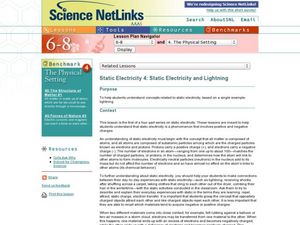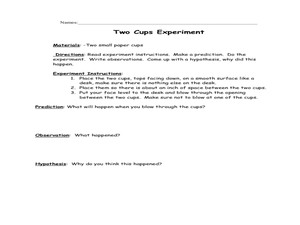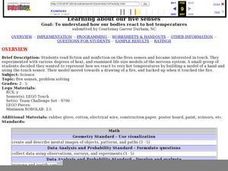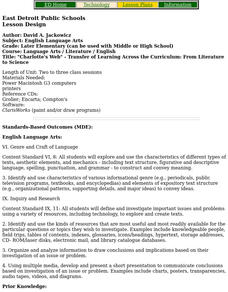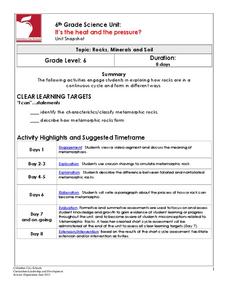Curated OER
Amazing Water Changes
Students explore the properties of water and how it changes states. In this kindergarten to 2nd grade science lesson, students pair a hands-on science activity with two suggested books. This inquiry lesson has extension activities to...
Curated OER
What Really Matters When it Comes to Sound?
Students conduct experiments to learn about sound wave vibrations in objects and pitch. Students test how varying the volume of water in a vessel changes frequency and pitch.
Curated OER
Rain, Rain, Go Away
Students conduct a number of experiments involving evaporation and condensation. They view and discuss a video about the water cycle and then design posters about the rain based on the book "Cloudy With A Chance of Meatballs".
Curated OER
Exploring The Great Salt Lake
Second graders experiment with sand samples taken from a lake. They use this as part of an inquiry that is based on observations. The properties of the sand are observed in the lab and recorded in writing. Prior to the lab students...
Curated OER
Hatching Chickens
Students learn the importance of caring for eggs as they hatch chickens. In this egg hatching lesson, students observe what happens when eggs are hatched into chickens by completing a e-worksheet and watching a web based movie.
Curated OER
Understanding Bernoulli's Principle
Fifth graders explain why we fly. In this space science activity, 5th graders discuss Bernoulli's prinicple and its relation to flight.
Curated OER
Rusting and the Scientific Method
Pupils observe the oil can scene with the tin man from a clip from "The Wizard of Oz" and answer the question, "What can we learn about rust from this scene?". They take 2 tubes and 2 nails, adding 1 salt packet to 2 ml of distilled...
Curated OER
How Do We Learn About the Past?
Sixth graders discuss the role of an archaeologist as a class. After viewing photographs, they relate the objects found in their local area and Ancient Egypt. They draw a picture of an object that represents their own culture and gives...
Curated OER
The Science of Papermaking and Paper Recycling
Students practice bleaching recycled fibers. Using colored copy paper, they cut it into strips and put it in a blender with water. They filter the pulp and stir in the bleach. They compare the original paper with the bleached sample...
Curated OER
Learning About Our Five Senses
Students study the sense of touch and various degrees of heat. They design a model that displays how the human hand reacts to heat using a touch sensor.
Curated OER
"Charlotte's Web" - Transfer of Learning Across the Curriculum: From Literature to Science
Students research and write about the parts of a spider's body using educational software. They draw spiders using computer software.
Curated OER
Scientific Inquiry
Middle schoolers make inferences about what activities occur at different places in school. They form a hypothesis as to how space is used. They simulate how archeaologists explore past people by designing and conducting a research project.
Kenan
Respiratory System
Explore the respiratory system with a model. First, pupils build a set of lungs to experiment how they inflate and deflate. Then, they delve deeper into the topic with a web quest to discover new information about the nose, trachea, and...
Curated OER
Population Biology Case Study
Students are focused on the big question: What makes a population grow and how could that growth stop? They use these concepts to help answer the big question: carry capacity, density dependent v. density, independent factors, predation...
Curated OER
Semipermeable Membranes and Bioaccumulation
Beginning biologists place a drop of food coloring into water of differing temperatures to observe the effect on the diffusion rate. They remove the shells from raw eggs and then experiment with osmosis over the remaining membranes....
NASA
Tools of the Trade
Did you know every state in the U.S. has at least one observatory? During the lesson, scholars research the cost of building and maintaining an observatory. They must present their information in a proposal to build a new observatory,...
Curated OER
Perceived Risks
Learners rank a list of everyday risks to compare with classmates. They rate each risk on both its ability to be controlled and its observability in the environment. Results are graphed.
Curated OER
The East Fork Project
Students identify possible sources of health risks, types of exposures, routes of exposure, and populations that could be affected after discussing water pollution and environmental health hazards. After discussion, students conduct a...
Columbus City Schools
It’s All Relative
Are the people on the other side of the world standing upside down? Pupils discuss the relationship between movement and position words. The unit explores the concept of reference points through animation, modeling, photography, and more.
Curated OER
Skin Cancer Investigation: A Multi-Component Project
Students compare the perceived and actual risks of getting skin cancer, while looking at ways to minimize these risks. They may have very little grasp of the severity of the threat of skin cancer or be unaware of the increase in the...
Curated OER
Kildare, USA: An Environmental Health Simulation
Your biology class plays the role of epidemiologist when a mysterious illness breaks out in Kildare, USA. Using interviews with doctors, patients, and local citizens, maps, the results from different materials sampling, they work to...
Columbus City Schools
It's the Heat and the Pressure?
Ready for a change? Give a comprehensive collection of metamorphic materials a try! With the assortment of printables and lab activities, you won't be under pressure to keep things lively. The unit culminates by having pupils complete an...
Cornell University
Classification
Explore the scientific method of classification. An interactive activity asks learners to create a classification system for a group of objects and develop a flow chart to communicate their systems. In addition, individuals use a...
Curated OER
The Five Classes of Vertebrates
What a terrific lesson! Learners discuss the animal kingdom, and classify them as vertebrates and invertebrates. They also identify them as fish, amphibians, reptiles, birds, and mammals. There is even a taxonomic breakdown of popular...


